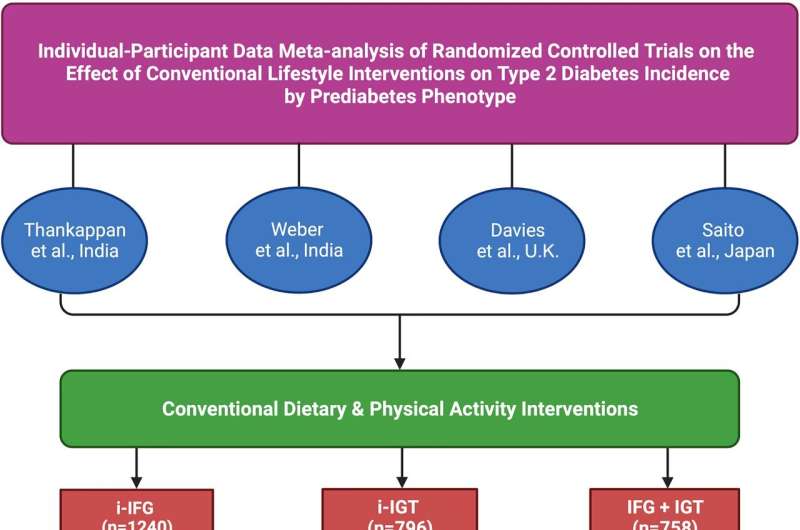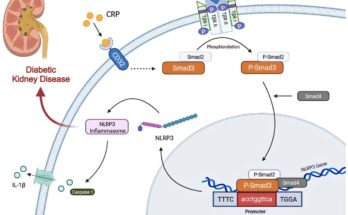
A substantial proportion of people with pre-diabetes are unlikely to respond to standard lifestyle programs used globally to prevent type 2 diabetes, according to new research by a consortium of researchers from the U.S., U.K. and India, along with the Baker Heart and Diabetes Institute.
The concerning findings, outlined in Diabetes Care by Dr. Sathish Thirunavukkarasu, highlight the need for precision prevention of type 2 diabetes beyond behavioral counseling to change a person’s diet and physical activity levels.
Two million Australians have pre-diabetes and are at high-risk of developing type 2 diabetes. Studies from 20 years ago showed that lifestyle interventions reduced the chances of progressing to diabetes among people with one form of pre-diabetes—impaired glucose tolerance. Standard practice around the world is to use these lifestyle programs in all people with pre-diabetes, even though many of them do not have impaired glucose tolerance.
Researchers sought to answer the question of whether the effect of conventional lifestyle interventions on diabetes incidence differs by pre-diabetes type by examining data from randomized controlled trials around the world.
They confirmed that diabetes incidence was reduced significantly in individuals with impaired glucose tolerance (with or without impaired fasting glucose) but found no effect in those with isolated impaired fasting glucose, which constitutes a substantial proportion of the global pre-diabetes population.
Senior author and Head of Clinical Diabetes and Epidemiology at the Baker Institute, Professor Jonathan Shaw said recent analysis of 14 studies with more than 27,000 individuals with pre-diabetes found that the proportional prevalence of those with this specific type of pre-diabetes—isolated impaired fasting glucose—was 58% in Caucasians and 48% in Asians.
In addition to its high prevalence, this phenotype of pre-diabetes increases the risk of developing diabetes four- to sixfold in comparison with a normal concentration of sugar in the blood and is a high-risk state for cardiovascular disease and even death.
He says more research is urgently required to identify effective interventions for this significant group of Australians, and those globally, who are at high risk of developing type 2 diabetes.
Professor Shaw says some promising strategies include a low-calorie diet (1,200 kcal/day) or high-intensity interval training, as they have been shown to normalize fasting plasma glucose and reverse the pathophysiology in people with type 2 diabetes.
“These findings may have significant consequences for how testing for pre-diabetes should be performed in Australia and the enrollment criteria and type of lifestyle intervention offered by current programs across Australia,” says President of the Australian Diabetes Society, Professor Anthony Russell.
The need for greater investment and focus on diabetes prevention comes as the Federal Government holds an inquiry into diabetes, including examining the evidence around prevention, diagnosis and management of diabetes in Australia.
More information:
Thirunavukkarasu Sathish et al, Effect of Conventional Lifestyle Interventions on Type 2 Diabetes Incidence by Glucose-Defined Prediabetes Phenotype: An Individual-Participant Data Meta-analysis of Randomized Controlled Trials, Diabetes Care (2023). DOI: 10.2337/dc23-0696
Provided by
Baker Heart & Diabetes Institute
Citation:
Lifestyle programs to prevent type 2 diabetes not meeting needs of many people with pre-diabetes (2023, October 5)
retrieved 5 October 2023
from https://medicalxpress.com/news/2023-10-lifestyle-diabetes-people-pre-diabetes.html
This document is subject to copyright. Apart from any fair dealing for the purpose of private study or research, no
part may be reproduced without the written permission. The content is provided for information purposes only.
Source link




